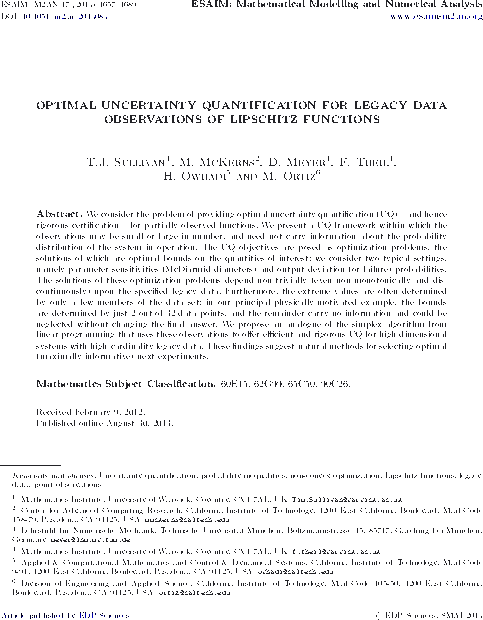
UQ for Legacy Data from Lipschitz Functions in M2AN
Mathematical Modelling and Numerical Analysis has just published a paper by Mike McKerns, Dominic Meyer, Florian Theil, Houman Owhadi, Michael Ortiz, and myself on optimal UQ for legacy data observations of Lipschitz functions.
In this paper, we address both mathematically and numerically the challenge of giving optimal bounds on quantities of interest of the form \(\mathbb{P}_{X \sim \mu}[f(X) \geq t]\), where the probability distribution \(\mu\) of \(X\) is only partially known through some of its moments, and the forward model \(f\) is partially known through some pointwise observations and smoothness information.
T. J. Sullivan, M. McKerns, D. Meyer, F. Theil, H. Owhadi, and M. Ortiz. “Optimal uncertainty quantification for legacy data observations of Lipschitz functions.” ESAIM. Mathematical Modelling and Numerical Analysis 47(6):1657–1689, 2013.
Abstract. We consider the problem of providing optimal uncertainty quantification (UQ) – and hence rigorous certification – for partially-observed functions. We present a UQ framework within which the observations may be small or large in number, and need not carry information about the probability distribution of the system in operation. The UQ objectives are posed as optimization problems, the solutions of which are optimal bounds on the quantities of interest; we consider two typical settings, namely parameter sensitivities (McDiarmid diameters) and output deviation (or failure) probabilities. The solutions of these optimization problems depend non-trivially (even non-monotonically and discontinuously) upon the specified legacy data. Furthermore, the extreme values are often determined by only a few members of the data set; in our principal physically-motivated example, the bounds are determined by just 2 out of 32 data points, and the remainder carry no information and could be neglected without changing the final answer. We propose an analogue of the simplex algorithm from linear programming that uses these observations to offer efficient and rigorous UQ for high-dimensional systems with high-cardinality legacy data. These findings suggest natural methods for selecting optimal (maximally informative) next experiments.
Published on Friday 30 August 2013 at 18:00 UTC #publication #m2an #ouq #ortiz #owhadi #mckerns #meyer #theil